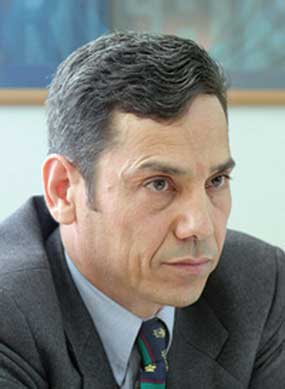Solitary Confinement Cause of Soltani’s Illnesses, Says Daughter

“Over the past six months, my mother kept submitting requests for my father’s transfer. My father has various ailments. He suffers from ulcers, anemia, and digestive track problems. My mother says that different specialists have been testing him and he is still in the stages of diagnosis,” Maedeh Soltani told the Campaign.
In an interview with the International Campaign for Human Rights in Iran, the daughter of Abdolfattah Soltani said that her father was hospitalized two weeks ago, following a deterioration in his health. Maedeh Soltani told the Campaign that the Iranian judicial authorities finally agreed to her father’s medical treatment outside the prison after months of requests for his transfer.
“Over the past six months, my mother kept submitting requests for my father’s transfer. My father has various ailments. He suffers from ulcers, anemia, and digestive track problems. My mother says that different specialists have been testing him and he is still in the stages of diagnosis,” Maedeh Soltani told the Campaign.
Abdolfattah Soltani, a prominent human rights lawyer, was arrested on September 10, 2011. On January 8, 2012, Branch 26 of Tehran Revolutionary Court under Judge Pirabbasi sentenced him to 18 years in prison, exile to Borazjan, and 20 years’ ban on his legal practice on charges of “being awarded the [2009] Nuremberg International Human Rights Award,” “interviewing with media about his clients’ cases,” and “co-founding the Center for Human Rights Defenders.” In June 2012, an appeals court reduced his prison sentence to 13 years.
“Most of my father’s illnesses are the result of the conditions of Ward 209 and solitary cells inside Evin Prison; they are the result of psychological pressure and whatever solitary confinement does to an individual. My father suffered different illnesses during that time and later, and because he received no treatment for them in the General Ward, his conditions worsened. My mother said that once she even saw my father limping during one of her visits with my father, but he never said a word about what had happened to him and the reason for the limp,” Soltani added.
“The doctors said that they can’t tell what my father’s problem is yet, but they have emphasized that he will need to be kept away in a stress-free environment with proper nutrition,” Abdolfattah Soltani’s daughter told the Campaign.
Maedeh Soltani told the Campaign that on three separate occasions in recent months, Abdolfattah Soltani refused to be transferred to the hospital in handcuffs. “My father is in the hospital without handcuffs now. The security forces knew that if they tried to transfer him in handcuffs again, that he would refuse to go. They also allowed my mother to be near him in the hospital, but they did not grant permission for other relatives, friends, and acquaintances,” she said.
Maedeh Soltani expressed hope that judicial authorities would agree with her father’s medical furlough.
Along with other prominent Iranian human rights lawyers Shirin Ebadi, Mohammad Seifzadeh, Mohammad Ali Dadkhah, and Mohammad Sharif, Abdolafattah Soltani established the Defenders of Human Rights Center in 2001. He has represented many political and civil activists such as Akbar Ganji, Zahra Kazemi’s family, Zahra Baniyaghoub’s family, and Haleh Esfandiari, as well as several National-Religious activists and members of the Tehran Bus Drivers Union. Presently, Mohammad Ali Dadkhah, another member of the DHRC, is in prison; Shirin Ebadi was forced into exile; and the organization’s spokesperson Narges Mohammadi was sentenced to six years in prison, but was released into her family’s custody after she developed complete muscular paralysis in prison.






